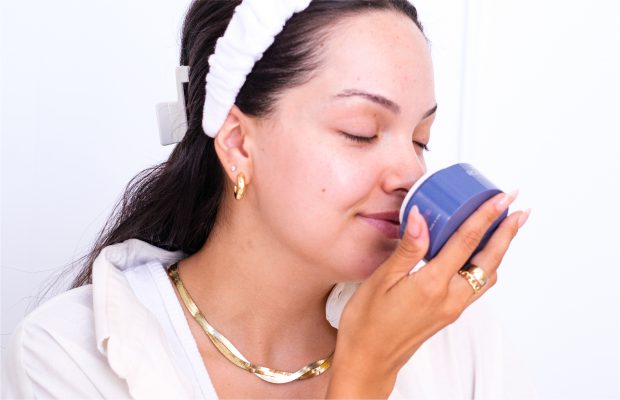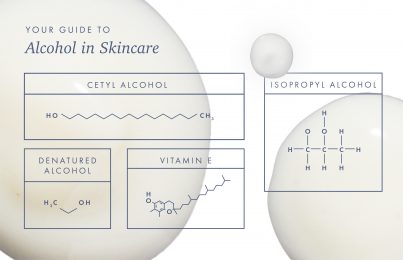In the world of skincare, few topics are as hotly debated as fragrance. As we’ve collectively embraced the concept of strengthening our moisture barriers, we’ve also eschewed irritating ingredients that can weaken or disrupt those barriers. While this is mostly a good thing, I also think some ingredients have been unfairly demonized. It doesn’t help that the wealth of information found on social media can often leave us feeling more confused than educated. When it comes to the chemistry involved in creating complex skincare formulas, things are rarely black and white. Whether or not an ingredient causes problems for someone’s skin typically depends on a whole host of factors, and fragrance is no exception.
- Fragrance-Free vs. Unscented
- What is Fragrance?
- Is One Type of Fragrance Better Than the Others?
- How Common is It to Have an Allergy or Sensitivity to Fragrance?
- Why Fragrance Labeling is Tricky
- Who Should Not Use Fragrance?
- The Verdict—Is Fragrance Bad?
- My Personal Philosophy on Formulating With Fragrance
In this post, I’ll shed some light on the topic and explain why you shouldn’t go throwing out your fragranced products just yet.
Fragrance-Free vs. Unscented
This may seem like splitting hairs, but before we continue, there’s an important distinction to be made between fragrance-free and unscented. As the name suggests, fragrance-free implies no fragrance material has been added to a formula whatsoever. Unscented, on the other hand, means a product might include ingredients meant to neutralize or mask the less-than-pleasant natural scent of a product. In unscented formulas, these ingredients aren’t added to give the product a distinct scent or flavor. But, once they’re in there, a product can no longer be deemed truly fragrance-free.
Learn more about the different marketing terms used in skin care and what they really mean.
What is Fragrance?
The term “fragrance” is a catch-all, and it encompasses thousands of different compounds that can go into creating a fragrance. Some of these compounds occur naturally in plants, some are derived from animals, and some are created synthetically.
Types of Fragrance in Skincare
Essential Oils
Essential oils are considered fragrances, and when added as an individual oil, they will be listed separately on an ingredient label. (For example, Rosmarinus Officinalis (Rosemary) Leaf Oil.) There are also fragrances known as chemical isolates, which you get by taking the primary chemical out of an essential oil and using it on its own. These typically won’t be listed separately and fall under that general “fragrance” umbrella.
Natural Fragrances
Natural fragrances are made of naturally occurring chemicals that are usually derived from plants. They can be derived from animals, but this isn’t really a common practice anymore. Natural fragrances don’t include any petroleum-derived chemicals.
Synthetic Fragrances
Synthetic fragrances are synthesized in a lab to mimic a naturally occurring fragrance ingredient that may be rare or unsustainable to source. They can also be used to create a distinct fragrance that can’t be found in nature. Synthetic fragrances often come from petroleum-derived chemistry.
If you see “fragrance” on an ingredient label, know that it can also be a blend of any of these three categories.
Is One Type of Fragrance Better Than the Others?
The short answer is no. People tend to assume natural fragrances are better than synthetic ones, but I think a lot of this has to do with the increased popularity of “clean” beauty marketing. It’s made many of us subconsciously (or consciously) associate “natural” with better.
The reality is that natural fragrances aren’t any less likely to cause irritation than synthetic fragrances. Some people get freaked out when they learn that synthetic fragrances are petroleum-derived because they associate this with petroleum fuel. But I can assure you, this is unwarranted! Aside from having the same point of origin, petroleum products found in skincare have almost nothing to do with the fuel you’re thinking of. Chemically speaking, they’re completely different structures because the ingredients used in skincare have been carefully refined to remove impurities. Take Vaseline, for instance—Vaseline is petroleum jelly, a petroleum-derived product, and it’s considered so safe that it’s even recommended by the National Eczema Foundation. (Speaking of Vaseline, read all about my thoughts on the popular slugging trend.)
The bottom line is that synthetic fragrances are extremely pure and predictable since they’re made in a lab, so their safety is well understood.
How Common is It to Have an Allergy or Sensitivity to Fragrance?
According to the American Academy of Dermatology, only about 1% of the population has a true fragrance allergy. If you’re allergic to certain fragrance compounds, any amount will set off a histamine response. Symptoms can include itching, swelling, hives, and redness.
When people talk about being sensitive to fragrance, most of them are really talking about irritation, which is very different from an allergy. When it comes to irritants, it’s all about the quantity of exposure. In other words, dose matters—a lot. You may find your skin gets irritated if you use very heavily scented products, but a product with a small amount of fragrance is likely fine.
This concept isn’t unique to just fragrance. Many things we deem totally safe can be potential irritants if used at a high enough concentration. One of my favorite examples is glycerin, considered to be one of the most innocuous ingredients out there. But, applied to people’s skin at 100% concentration during certain testing, even this caused irritation. For a while, this led to people online perpetuating the myth that glycerin is an irritant.
Of the thousands of chemicals that can be used to create a scent, only a small portion of them tend to cause allergies or irritation. Again, it’s all about dosage.
Sensitive, easily-irritated skin? Learn more about how to avoid a negative reaction to a skincare product.
Why Fragrance Labeling is Tricky
While the good news is that only a fraction of fragrance compounds are likely to cause irritation, the bad news is that it can be hard to identify them just by looking at an ingredient label. The Fair Packaging and Labeling Act (FPLA) of 1977 is what allows companies to simply put “fragrance” or “parfum” on a label rather than disclosing the individual compounds that make up a scent. A big reason for this is that a lot of those scents are proprietary, so brands didn’t want to disclose them. This means that if you are someone who reacts badly to certain compounds, seeing “fragrance” on an ingredient label won’t necessarily tell you whether or not you’ll react to that product.
In the EU, brands are required to list certain fragrance compounds. This is based on a list of 26 common allergens as identified by an international dermatological group. If the amount used exceeds a certain threshold level, they must be listed separately.
In December 2022, Congress passed the Modernization of Cosmetics Regulation Act (MoCRA). This will be the first significant change to how cosmetics are regulated in the U.S. since the 70s. Once MoCRA is enacted, companies in the U.S. will likely be required to disclose the same common allergens.
Who Should Not Use Fragrance?
Although fragrance in skincare is overwhelmingly considered safe, there are some people who should avoid it for good measure. This mainly includes those with chronic, inflammatory skin conditions like eczema or rosacea. Of course, it also includes the 1% who are allergic to certain fragrance compounds.
If you suspect you might have an allergy to fragrance or that fragrance is irritating your skin, it’s best to make an appointment with a board-certified dermatologist. If you have sensitive skin, it’s also worth patch-testing new products before using them.
The Verdict—Is Fragrance Bad?
As you can now understand, it’s hard to give a definitive answer to this question since the topic is so nuanced. But generally speaking, when used in reasonable amounts, fragranced skincare is unproblematic for a majority of people. True allergies are rare, and irritation comes down to the amount of fragrance you’re being exposed to.
It’s worth noting that one reason more people may be reporting irritation from fragrance is that we’re using more skincare products than ever before. If you use multiple, heavily fragranced products every day, this is increasing your quantity of exposure. In addition, many of these products now contain potent, active ingredients. If you use too many harsh or active products, you might be compromising your moisture barrier. A compromised barrier becomes sensitive to ingredients that wouldn’t otherwise be an issue, like fragrance.
I urge you to remember that product formulators (like myself) and cosmetic chemists working behind the scenes tend to be very well-versed in which ingredients are common allergens. The absolute goal is to create safe, yet effective products that all skin types will be able to benefit from.
My Personal Philosophy on Formulating With Fragrance
When creating a new product, whether or not to add fragrance is just one of the many decisions I make. These are a few things I take into consideration when making that decision:
- Which skin type the product is for
- Whether the product is rinse-off or leave-on
- If the product is water-based (these tend to penetrate deeper within the skin, potentially activating nerve endings)
- If the product is oil-based (these have larger molecules that sit on the skin, so they’re sometimes better suited to fragrance)
These are just a few examples, but what people should understand is how nuanced the process is. Like many other formulators, I don’t take these decisions lightly and I always want to create the best experience for my customers. I know the main goal of skincare is to improve the appearance of the skin, but for many of us, skincare is also a ritual. It’s part of our self-care routine, and self-care should be pleasant and enjoyable! I personally like having the sensorial experience that a small amount of fragrance can bring to my skincare routine. (And yes, I do mean a small amount. When I want a more intense scent, I reach for perfume instead.) At the end of the day, it really comes down to personal choice. As the consumer, you get to decide what kind of experience you want to have when using your skincare products. Learn more about my personal skincare philosophy and how it guides me when I formulate.
I hope this post gives you some insight into the misunderstood world of fragrance in skincare products!
Up next, learn more about how your skincare products are tested to ensure safety.
Celebrity Esthetician & Skincare Expert
As an esthetician trained in cosmetic chemistry, Renée Rouleau has spent 30 years researching skin, educating her audience, and building an award-winning line of products. Her hands-on experience as an esthetician and trusted skin care expert has created a real-world solution — products that are formulated for nine different types of skin so your face will get exactly what it needs to look and feel its best. Trusted by celebrities, editors, bloggers, and skincare obsessives around the globe, her vast real-world knowledge and constant research are why Marie Claire calls her “the most passionate skin practitioner we know.”




Comments:
Loved this! Helped me rethink fragrance and skincare routine. Thanks
Posted By: Satellite Tv |
Beneficial info. and such a nice explanation. Thank you so much for giving this valuable information to us. we are thankful to you.
Posted By: ikta aromatics |
I loved reading this article on fragrance in skincare! The detailed explanations of what fragrance is and how it’s used in skincare products were incredibly informative. I appreciate how the potential negative effects of fragrance were also discussed. Thank you, Renee Rouleau, for providing such valuable information.
Posted By: Peter Smith |
My skin reacts so badly to fragrance. Particularly synthetic fragrances. This has been super helpful- thank you!
Posted By: charlotte miskell |